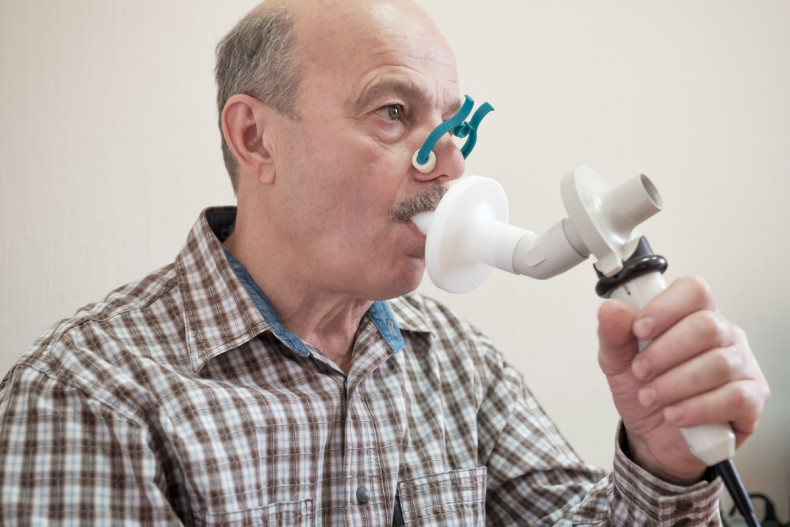Lung diseases often co-exist with other conditions, such as hay fever, heart conditions and gastrointestinal diseases. As the symptoms of many lung conditions overlap with other diseases, a lung health assessment is a useful tool to diagnosing other underlying conditions. Our lung health check service aims to identify and diagnose underlying risk for early management and treatment, therefore achieving the best possible outcomes.
Symptoms are not always obvious
In the UK, around 585,000 respiratory disease diagnoses are made each year, with half of those relating to asthma and chronic obstructive pulmonary disease (COPD: a condition which affects airflow to the lungs). Despite these diagnoses, many lung conditions remain underdiagnosed. For example, it is thought that up half of people with COPD are undiagnosed.
As the symptoms of a lung condition can be symptomatic of other conditions, the underlying cause is not always obvious. For example, the symptoms of long COVID-19 often overlap with respiratory symptoms, reinforcing the importance of further investigation for a clearer and more accurate diagnoses and prognosis.
Dr Sundeep Kaul, consultant in intensive care and respiratory medicine at Harefield Hospital, explains, “The five main symptoms of a lung condition are breathlessness, cough, wheeze, chest pain, and infection. As these symptoms can be indicative of other conditions, we always consider our patients’ full clinical history.” Our lung health check therefore acts as the first step to identifying and diagnosing respiratory conditions, non-respiratory conditions, or the interplay between them.
Lung health check for early intervention
“We commonly see patients who have diagnosed health conditions, such as heart disease, COPD or other infections. However, we see many patients with underlying conditions, who are worried about breathlessness, a cough, or they are generally feeling unwell,” explains Dr Jaymin Morjaria, consultant in respiratory medicine at Harefield Hospital.
Our lung health check is the first step to investigating our patients’ health, and we can work with them to establish a diagnosis and care plan. While our care for each patient is personalised, we will often begin by performing a set of initial tests. These tests include:
- blood tests
- heart rate and blood pressure checks
- spirometry – determines how much air you can inhale and exhale
- electrocardiogram (ECG) – checks your heart’s rhythm and electrical activity
From there, any abnormalities will be further investigated. “Early detection means we can provide the best patient outcome,” Dr Morjaria adds.
Individualised care for every patient
Our multi-disciplinary approach means we can collaborate with colleagues across various departments, ensuring our patients receive the most appropriate care for their needs. For example, if we discover our patient has an underlying heart problem, we can provide cardiac MRI (to look at the structure and function of the heart), an echocardiogram (to look at the heart and surrounding blood vessels), and/or a seven-day ECG (to detect any abnormality in the heart’s rhythm).
We also have links to other centres, including neurology, orthopaedic and gastrointestinal (GI), if our patient requires that area of care. “Having a one-stop shop is attractive to our patients because it means they can be diagnosed and referred to the appropriate specialities, and we are still coordinating and managing their care,” says Dr Kaul.
“We believe in a complete assessment rather than leaving unanswered questions. Our lung health check may be the first step in a patient’s journey, but we ensure our patients receive full body optimisation to target all their needs,” he adds.
If our patient would like a follow-up appointment after their initial screening, we can offer that, too. “As we follow our patients throughout their entire journey with us, we understand their clinical history and concerns, and they trust us to provide personalised care that will offer them the best outcomes. We can be advocates for our patients,” says Dr Kaul.
Get in touch
Our lung health check is available for patients with a range of symptoms, including breathlessness, cough, chest pain and wheeze. We are also happy to see patients with symptoms of long COVID-19, unexplained infections, night sweats, weight loss, excessive daytime sleepiness and snoring.
If you are worried about your symptoms or are generally feeling unwell, our specialists can help. Please contact our customer services team for further details.
Related content
-
Diagnostic tests for lung conditions
Our advanced, high-quality diagnostic facilities can help rapidly diagnose lung conditions.
-
Lung cancer risk assessment
Our world-leading specialists can assess your risk of developing lung cancer during a consultation.
-
Lung health assessment
Our lung health assessment service is accessible to patients with a range of symptoms, including breathlessness, cough, chest pain, and wheezing.

